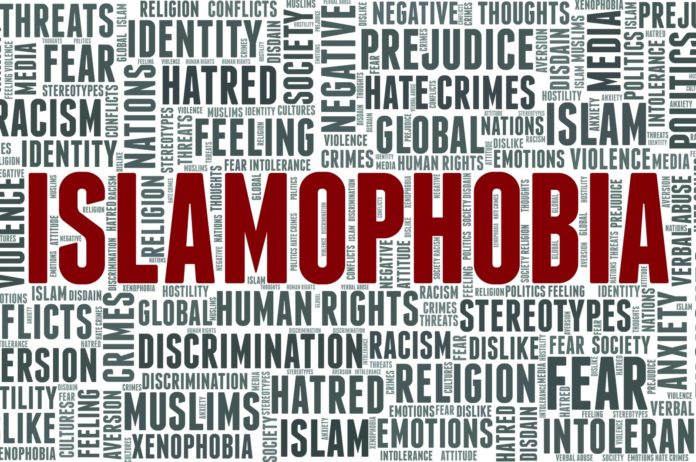By Dr Majid Khan
Dr Mughees Sheikh writes in his doctoral thesis, “After the end of the Cold War, Islam will be an eminent ‘threat candidate’ for the US media”. Mughees Sheikh’s findings in 1992 did predict the inception of a socio-political and media discourse that we now call Islamophobia. But Islamophobia comes into the public debate after 9/11.
Islamophobia is defined as extreme fear and dislike of Islam as a religion, an ideology and a political force. As a phenomenon, it involves prejudice, discrimination and hostility against Islam and Muslims (Dr Zafar Iqbal). But, on the opposite aspect political leaders, media, and the general public across the West have used this term to explain Islam and Muslims as a threat to their identity, culture and financial system.
Islamophobia is on the rise since 9/11. In a report (March 2022) submitted by the General Secretariat of the Organization of Islamic Cooperation (OIC), concludes that Islamophobia would continue, especially with indications that it continued to increase over the past five years. The report also highlights that Covid-19 is among the major factors that led to the spread of Islamophobia globally in 2021, along with the agenda of the extreme right, the crisis of immigrants and refugees, attacks by extremist and terrorist groups, as well as hate speech adopted by some media.
Western media plays a vital in spreading Islamophobia. For example, in US, 2016, the election campaign, was openly anti-Muslim and anti-Islam. The campaign resulted in a 227 per cent rise in hate crime in a year, according to the FBI. The increase in hate crime was even larger than in the year immediately after 9/11. This shows how Western media is lethal against Islam and Muslims.
Dr Zafar Iqbal, Dean of International Islamic University (IIUI), Pakistan highlights the alarming fact that the academia, social scientists, researchers, media and political leaders of the Muslim world have failed to counter Islamophobia narratives prevailing in the West in particular, and around the globe in general. It’s also been noticed that scholars and researchers from the Muslim world have, one way or the other, overlooking the need to deconstruct Islamophobia and increase a concerted reaction to it.
The strong voice against Islamophobia in recent history is the former Prime Minister of Pakistan Imran Khan. Mr Khan raised the issue of Islamophobia in the West and its negative fallout. At the UN General Assembly and the 14th Organization of Islamic Countries (OIC) summit in Makkah, he stressed that the response of the Muslim world to the ever-increasing Islamophobia in the West had been insufficient. Mr Khan’s supporters claim that under his pressure the UN General Assembly has designated the 15th March of each year as the International Day against Islamophobia.
Dr Zafar analyses that the examination of the present trends of the coverage of Islam seems to suggest that the Western media through its portrayal of ‘Islamists’ as ‘Islamic fundamentalism’ is trying to dehumanize ‘Islamists’, referring to Islam as a disease and then acting to eradicate it. That is, seeds have been planted to set the stage for the future agenda of the US media. The result might be a clash of worldviews, values, and civilizations.
According to the OIC report (2022), in Islamophobia cases, Europe ranked first, followed by Asia then North America. The report indicated that France and Britain witnessed the highest rates of activities related to Islamophobia, especially through government policies that seemed to serve increasingly Far-right tendencies. The report also noted a similar pattern in Asia, especially in India and Sri Lanka, where the phenomenon has intensified due to existing tensions with Buddhist monks in Myanmar and the tension with the Rohingya Muslims. The report indicated that attacks and incidents usually committed by elements of the far-right have receded in the American region. It also specified that different regions of the world witnessed an increase in Islamophobia during the outbreak of the Covid-19 pandemic. Some social media sites blamed Muslims for spreading the virus, claiming that some of them were insisted on performing congregational prayers, or deliberately spreading the epidemic. This, and other false stories, resulted in many attacks against Muslims.
As for hijab or burqa (face cover) wearing, the report noted that due to the spread of protective medical masks prompted by Covid-19, 2020 witnessed a decline in the severity of rejecting this outfit. However; the problem soon reappeared with the pandemic receding. France, Switzerland, and Austria were among the countries that banned the hijab in government departments, universities and schools. Other countries such as Belgium, Norway, the Netherlands, Germany, Spain, Italy, Denmark, Bulgaria, Latvia, Kosovo and Sri Lank, adopted less severe policies against the wearing of the hijab.
This is a matter of fact that the rising Islamophobia is not only a threat to Muslims but it’s for the whole of mankind. The Muslim world is facing the challenge of Islamophobia and the role of academia is imperative to counter this negative propagation of Islam as research and presentation of Islam’s true picture is the ultimate need of the hour.
The global leaders should acknowledge that religious violence or Islamophobia is a critical risk going through in the modern world. For instance, following the Christchurch attack, mosques in Birmingham, UK (United Kingdom), have been additionally focused on equal mentality misfit social factors, therefore the civilised global desires to take prompt moves towards religious violence. For harmony, it’s the need for interfaith dialogue, pronouncing the use of forces can’t remedy the matter but the know-how understand each other and not interfering in others’ spiritual topics can carry peace.
It is the need of the time United Nations in collaboration with member states must come forward and play an active role in eradicating religious violence. Civilised global should denounce all styles of violence in any other case it would smash humanity, they maintained.
Dr Majid Khan is a PhD Scholar of media, from Australia. He writes on Image Building, Psychological Warfare, Image Warfare and Propaganda.






